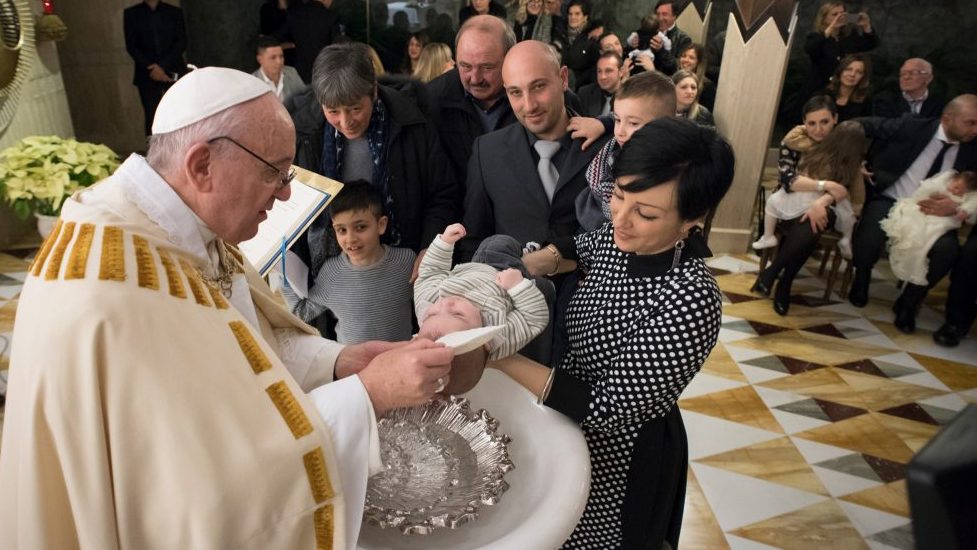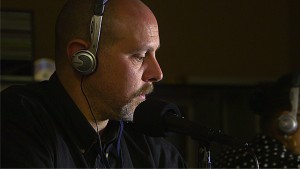

Deacon-structing Baptism Part 3: The Ritual
Deacon Pedro
Sunday, February 4, 2018

Matter and Form
Remember also that all rituals of Sacraments consist of matter and form. In the case of Baptism the matter is the water being poured and the form are the words: “I baptise you in the name of the Father, the Son and the Holy Spirit.” Without these two elements, the Sacrament does not take place. The ordinary ministers of Baptism are priests or deacons although anyone can administer Baptism in an emergency (we are all extraordinary ministers).Why water?
Once, Jesus said to a man named Nicodemus that no one can see the kingdom of God without being born from above. Nicodemus asked, “How can anyone be born after having grown old? Can one re-enter a mother’s womb?” Jesus answered, “Truly I tell you, no one can enter the kingdom of God, without being born of water and spirit.” (John 3:5) Since the beginning of the world, water has been a source of life. The book of Genesis says that God breathed upon the waters, blessing it and making it the wellspring of all holiness. Then of course we have the story of Noah’s Ark, where the waters came to put an end to sin and Noah and his family were saved. And then there’s the story of the crossing of the Red Sea, where God liberated the Jewish people from the Egyptians. So, in Baptism, we remember that God blesses us, saves us and liberates us.Plunging
As I wrote last week, the word Baptism comes from the Greek word baptizein, meaning to plunge or to submerge. And so the “plunging” into the water represents being buried with Jesus, so we can die to our old self or way of life, and the coming up as a new creature. The Sacrament of Baptism is also called “the washing of regeneration and renewal by the Holy spirit” (from Titus 3:5 – let’s not forget the action of the Holy Spirit in this Sacrament) because Baptism actually brings about the birth of water and spirit without which no one can enter the Kingdom of God (as Jesus explained to Nicodemus).Grace
So now you should understand why the Catechism of the Catholic Church says (CCC#1279-1280) that in Baptism we receive the following graces:- We are purified from original sin and all personal sin
- We become new creatures in Christ
- We are incorporated into the body of Christ, the Church
- We are left with an indelible mark that cannot be erased.
Deep Longings
But for me, it’s always important to remember that all the Sacraments satisfy a deep human longing. In Baptism God satisfies our human longing for belonging by welcoming us into His family, and giving us his own life. In Baptism we become a new creation in Christ through the power of the Holy Spirit and are freed from the power of death. Baptism incorporates us into Christ and forms us into God’s people where we can truly and honestly call God Abba, Father. Send in your comments. Always love to read them. This post is the conclusion of a 3-part series on Baptism. Read all of them: part one, part two --To read all about the Sacraments, you don't need to go further than this blog site: Sacraments Part 1 and Part 2. Part 3 Baptism: Part 1, Part 2 and Part 3. Reconciliation Part 1, Part 2 and Part 3 Eucharist: Part 1, Part 2, Part 3 and Part 4. Confirmation: Part 1, Part 2, Part 3, Part 4 and Part 5. Marriage: Part 1, Part 2, Part 3, Part 4, Part 5, Part 6, Part 7, Part 8, Part 9 and Part 10. Ordination: Part 1, Part 2. Anointing of the Sick: Part 1, Part 2, Part 3
 Every week, Deacon Pedro takes a particular topic apart, not so much to explore or explain the subject to its fullness, but rather to provide insights that will deepen our understanding of the subject. And don’t worry, at the end of the day he always puts the pieces back together. There are no limits to deaconstructing: Write to him and ask any questions about the faith or Church teaching:pedro@saltandlighttv.org @deaconpedrogm
Every week, Deacon Pedro takes a particular topic apart, not so much to explore or explain the subject to its fullness, but rather to provide insights that will deepen our understanding of the subject. And don’t worry, at the end of the day he always puts the pieces back together. There are no limits to deaconstructing: Write to him and ask any questions about the faith or Church teaching:pedro@saltandlighttv.org @deaconpedrogmRelated Articles:
Category: Deacon-structing, Faith Education, Featured, Twitter
Tag: Baptism, Sacraments
Dominican Friars Youth Interfaith Video Contest 2025
Thursday, March 13, 2025
 Salt + Light Media
Salt + Light Media
The Office for Interreligious Dialogue and the Dominican Friars of Toronto invite students in grades 9-12 to participate in the 2025 Youth Interfaith Video Contest.
Visit local pilgrimage sites this Jubilee Year
Thursday, January 30, 2025
 Maria Montemayor
Maria Montemayor
For the Jubilee of Hope, there are designated local pilgrimage sites in every country, and Canada is no exception. How is a local pilgrimage site determined? The local bishop can designate any parish, shrine, or basilica in his territory as a Jubilee Year pilgrimage site.
Creating Catholic streetwear
Thursday, January 9, 2025
 Maria Montemayor
Maria Montemayor
Fashion and clothing designed to draw people closer to God can inspire and even sanctify others. Nate Nagello, the CEO and owner of the Toronto-based Sanctified Collective, hopes the clothing he creates can provide opportunities for conversation, engagement, and evangelization.
When do you pray the Rosary?
Wednesday, December 4, 2024
 Maria Montemayor
Maria Montemayor
The Rosary is powerful: many graces can be bestowed upon those who pray it, and it can also offer special protection. Reciting the Rosary aloud in church and praying for the pope’s intentions can grant the supplicant a plenary indulgence.
Deacon-structing: What is a Heresy?
Tuesday, November 12, 2024
 Deacon Pedro
Deacon Pedro
What is the difference between heresy and simple disagreement? Looking at some of the main heresies throughout history might light the way forward.










